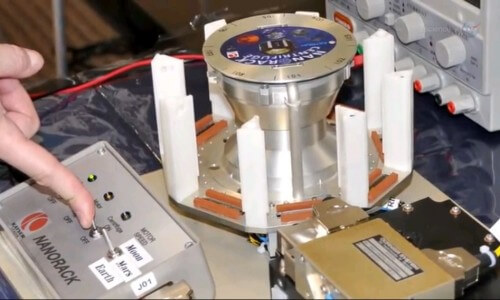Generations of flies will be able to be studied for the purpose of examining the genetic and behavioral changes in space, and thus it will be possible to learn about the effect of long space flights on humans

Fruit flies are insect-eyed and slimy, they love rotten bananas and, instructed by their pinhead-sized brains, they can lay up to hundreds of eggs a day. Despite all these oddities we have a lot in common.
In general, humans and fruit flies are surprisingly similar, explains biologist Sharmila Bhatkarya of NASA's Ames Research Center. "About 77% of the known genes that cause diseases in humans correspond to areas in the genetic code of fruit flies and about 50% of the protein sequences of fruit flies have a counterpart in mammals.
This is why fruit flies, known by their scientific name Drosophila melanogaster, are very common in genetic laboratories. They reproduce quickly, so many generations can be studied in a short time, and their genomes are completely mapped. Drosophila is used as a genetic model for several human diseases such as Parkinson's and Huntington's disease.
Now they are to be used as a genetic model for astronauts. "We are sending fruit flies to the International Space Station," says Bhatkarya. "They will orbit the Earth alongside the astronauts and help us study the effects of long space flights on humans."
The flies will live in a special facility developed at the Ames Center known as the "Fruit Fly Laboratory." Inside it they will live the short life of the flies - they will live, die, reproduce and experience the same radiation and microgravity as humans. Cameras will record the behavior of the miniature astronauts and some of them will be frozen and returned to Earth for examination.
This research was recommended by the National Science Council in the USA. In the survey of the last decade, the heads of the council commented that
"Model systems offer valuable insight into basic biology" and called for "coordinated efforts to identify common changes in gene expression among model systems in space."
"The fruit flies will allow us to examine a variety of questions such as the effect of space flights on aging, cardiovascular fitness, sleep, stress and more," she said.
Bhatkarya's personal interest is in the immune system, it has always been known that astronauts' ability to resist disease weakens in space. It turns out that the same thing happens to fruit flies. "We sent fruit flies aboard the Space Shuttle Discovery in 2006 and all of them had immune system damage," said Bhattakarya.
A shuttle flight was short, only 13 days, but the astronauts who will fly to Mars and distant places will live in space for much longer. A residential facility for fruit flies that will be installed on the space station will allow researchers to perform direct experiments relevant to long space flights.
The immune system of human astronauts can be tricky because each astronaut has their own genetic code. "What's good about the fruit flies we send is that they will all be genetically identical," Bhatkarya said. "We can do better science in such a population."
The flies on the space station will also have a giant wheel, a centrifuge where the flies will be subjected to a gravity similar to that of the Earth, which will allow researchers for the first time to make comparisons of the effect of radiation and gravity on the flies. "This is groundbreaking research," Bhatkarya said.
The fruit fly laboratory is planned for launch at the end of summer this year (2014) aboard a SpaceX rocket.
A new video in NASA's ScienceCast series reveals the benefits of fruit flies as astronauts. The Drosophila can help NASA fly deeper into space than before.
